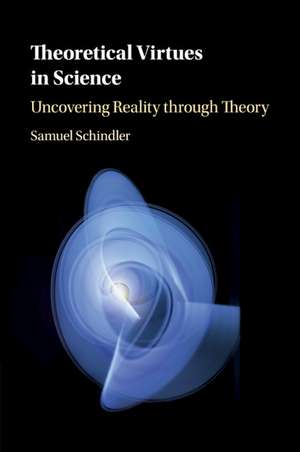Theoretical Virtues in Science: Uncovering Reality through Theory
Autor Samuel Schindleren Limba Engleză Paperback – 25 mar 2020
| Toate formatele și edițiile | Preț | Express |
|---|---|---|
| Paperback (1) | 283.63 lei 6-8 săpt. | |
| Cambridge University Press – 25 mar 2020 | 283.63 lei 6-8 săpt. | |
| Hardback (1) | 693.18 lei 3-5 săpt. | |
| Cambridge University Press – 23 mai 2018 | 693.18 lei 3-5 săpt. |
Preț: 283.63 lei
Nou
Puncte Express: 425
Preț estimativ în valută:
54.27€ • 56.82$ • 44.91£
54.27€ • 56.82$ • 44.91£
Carte tipărită la comandă
Livrare economică 05-19 aprilie
Preluare comenzi: 021 569.72.76
Specificații
ISBN-13: 9781108435031
ISBN-10: 1108435033
Pagini: 261
Ilustrații: 10 b/w illus.
Dimensiuni: 152 x 228 x 14 mm
Greutate: 0.35 kg
Editura: Cambridge University Press
Colecția Cambridge University Press
Locul publicării:Cambridge, United Kingdom
ISBN-10: 1108435033
Pagini: 261
Ilustrații: 10 b/w illus.
Dimensiuni: 152 x 228 x 14 mm
Greutate: 0.35 kg
Editura: Cambridge University Press
Colecția Cambridge University Press
Locul publicării:Cambridge, United Kingdom
Cuprins
Introduction; 1. Theoretical virtues, truth, and the argument from simplicity; 2. Pessimism, base rates, and the no-virtue-coincidence argument; 3. Novel success and predictivism; 4. Theoretical fertility without novel success; 5. Ad hoc hypotheses and the argument from coherence; 6. Virtues as confidence boosters and the argument from choice; 7. Philosophy of science by historical means; Conclusion.
Recenzii
'In this ambitious book Samuel Schindler mounts a sustained defence of scientific realism, challenging the most important antirealist arguments with a comprehensive and multi-layered appeal to theoretical virtues. His advocacy for the general truth-conduciveness of these virtues, rejecting the lure of predictivism, is both balanced and persuasive.' Hasok Chang, University of Cambridge
'Steeped in the history of science and bursting with examples, this book turns a spotlight on the 'theoretical virtues' and their role in determining what the natural sciences reveal about our world. Fearlessly contesting received views of the import of novel predictions and the nature of ad hoc hypotheses, Schindler shows by example how general philosophy of science, and the history and philosophy of science, are indispensable to an understanding of scientific knowledge.' Anjan Chakravartty, University of Notre Dame, Indiana
'The book is clearly written, well-informed about both philosophy and history of science, and makes numerous incisive points. I would recommend this as an excellent guide to the literature, due to its clear overarching narrative thread, and the fact that Schindler is not afraid to point out various oddities and sources of confusion in the literature.' Darren Bradley, Metascience
'Steeped in the history of science and bursting with examples, this book turns a spotlight on the 'theoretical virtues' and their role in determining what the natural sciences reveal about our world. Fearlessly contesting received views of the import of novel predictions and the nature of ad hoc hypotheses, Schindler shows by example how general philosophy of science, and the history and philosophy of science, are indispensable to an understanding of scientific knowledge.' Anjan Chakravartty, University of Notre Dame, Indiana
'The book is clearly written, well-informed about both philosophy and history of science, and makes numerous incisive points. I would recommend this as an excellent guide to the literature, due to its clear overarching narrative thread, and the fact that Schindler is not afraid to point out various oddities and sources of confusion in the literature.' Darren Bradley, Metascience
Notă biografică
Descriere
In-depth discussion of the value of scientific theories, bringing together and advancing current important debates in realism.
